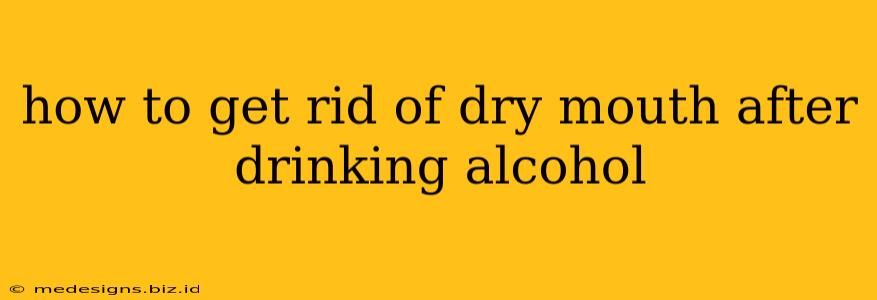Many people experience that unpleasant dry mouth feeling after a night of drinking. This isn't just uncomfortable; it can also contribute to bad breath and even impact your sleep. But don't worry, there are several effective ways to combat this post-alcohol dehydration. This guide will provide you with practical tips and tricks to rehydrate and alleviate that cottonmouth sensation.
Understanding Alcohol's Dehydrating Effect
Alcohol is a diuretic, meaning it increases urine production. This means your body excretes more fluids than it takes in, leading to dehydration. This dehydration is the primary culprit behind that dreaded dry mouth. Other contributing factors can include the type of alcohol consumed, the amount you drink, and individual metabolic differences.
Why Does Alcohol Cause Dry Mouth?
Alcohol inhibits the production of saliva, which is crucial for keeping your mouth moist. This reduction in saliva flow leaves your mouth feeling parched and uncomfortable. The effect is magnified by dehydration, creating a vicious cycle.
Effective Ways to Relieve Dry Mouth After Drinking
Thankfully, there are several effective remedies you can try to alleviate dry mouth after a night of drinking. Here are some of the best options:
1. Hydrate, Hydrate, Hydrate!
The most straightforward solution is to drink plenty of water. This helps replenish the fluids lost through urination. Avoid sugary drinks, as they can worsen dehydration. Water is your best friend in this situation. Aim for several glasses of water throughout the day following your alcohol consumption.
2. Electrolyte Drinks
Alcohol can deplete electrolytes, essential minerals that help regulate your body's fluid balance. Consider replenishing these electrolytes with sports drinks or electrolyte water. These drinks can help rehydrate you more effectively than plain water alone. However, be mindful of added sugars.
3. Oral Rehydration Solutions (ORS)
For severe dehydration, oral rehydration solutions (ORS) can be beneficial. These are specifically formulated to replenish fluids and electrolytes lost due to dehydration. They're readily available at most pharmacies.
4. Sugar-Free Gum or Candy
Chewing sugar-free gum or sucking on sugar-free hard candies stimulates saliva production, helping to moisten your mouth. Be sure to choose sugar-free options to avoid adding to the problem.
5. Increase Humidity
If the air is dry, it can exacerbate dry mouth. Consider using a humidifier, especially at night, to add moisture to the air. This can provide some relief from the dryness.
6. Avoid Caffeine and Tobacco
Both caffeine and tobacco are dehydrating substances. Avoiding them, particularly after consuming alcohol, will help to minimize further dehydration.
7. Eat Fruits and Vegetables
Many fruits and vegetables have high water content, which can help contribute to your hydration. Consider including watermelon, cucumbers, or oranges in your diet after a night of drinking.
Preventing Dry Mouth in the Future
Prevention is always better than cure. Here are some tips to help prevent dry mouth from alcohol:
- Drink in moderation: Limiting your alcohol intake is the most effective way to prevent dehydration.
- Alternate alcoholic beverages with water: This simple strategy can significantly reduce dehydration.
- Stay hydrated throughout the night: Don't wait until you wake up feeling parched to start drinking water.
When to Seek Medical Attention
While most cases of alcohol-induced dry mouth resolve with simple hydration strategies, persistent or severe dehydration warrants medical attention. Seek help if you experience:
- Severe thirst
- Dark-colored urine
- Lightheadedness or dizziness
- Rapid heart rate
By following these tips and being mindful of your alcohol consumption, you can effectively manage and reduce the likelihood of experiencing dry mouth after drinking. Remember, hydration is key!
